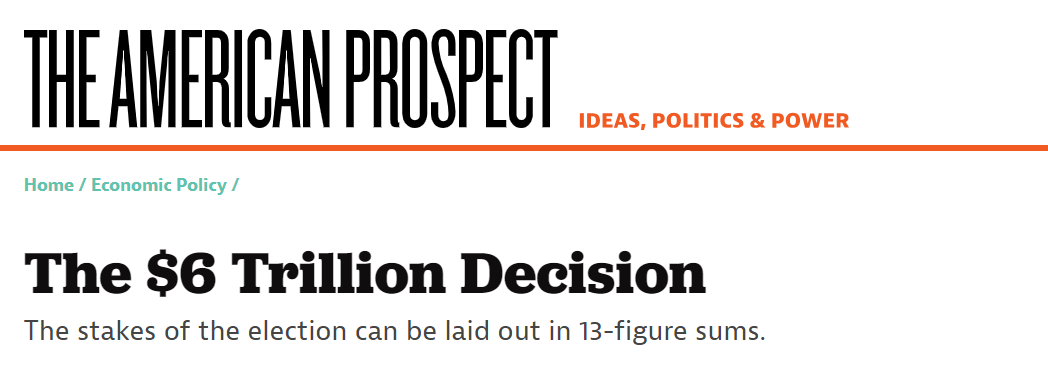Welcome to DU!
The truly grassroots left-of-center political community where regular people, not algorithms, drive the discussions and set the standards.
Join the community:
Create a free account
Support DU (and get rid of ads!):
Become a Star Member
Latest Breaking News
General Discussion
The DU Lounge
All Forums
Issue Forums
Culture Forums
Alliance Forums
Region Forums
Support Forums
Help & Search
General Discussion
Related: Editorials & Other Articles, Issue Forums, Alliance Forums, Region ForumsThe $6 Trillion Decision

https://prospect.org/economy/2024-04-15-6-trillion-dollar-decision-tax-policy/

Enormous amounts of presidential election messaging and coverage will unfurl between now and November 5. You will surely hear a lot about abortion, immigration, and inflation. You will hear about a fight for the future of American democracy. Even more likely, you’ll hear about polls, strategies to attract working-class and minority voters, or what one candidate said or tweeted or posted, or designated a surrogate to say or tweet or post. Oh, and court cases. Lots and lots of court cases. What you might not hear as much about are the stakes of the election’s outcome for all the money in the country. On Tax Day, of all days, it seems like a good time to lay that out. Nearly all of the provisions of the 2017 Trump tax cuts affecting individual tax returns expire at the end of 2025. Who is in control of the government at that time will depend, of course, on the outcome of the elections. The people then in charge will determine the next American tax policy, and economic and fiscal policy. Will we simply make permanent the Trump tax cuts, with all their attendant inequities?
Will we revert back to an Obama-era tax code that still has too many of the assumptions of Reagan-era tax policy embedded within it? Or will we use the moment to revolutionize tax policy and make a lasting break with the past four decades of trickle-down? The choice here will determine whether we use revenues generated by a new tax code for benefits for the American people, or forsake them in favor of shielding the wealthy and well-connected from paying their fair share. “The tax code is the last living thing of trickle-down economics,” said Elizabeth Pancotti, a former adviser to Sen. Bernie Sanders (I-VT), who is now director of special initiatives at Roosevelt Forward. Pancotti has a paper out today framing the looming expiration of the Trump tax cuts as an opportunity rather than a challenge. “If we can’t fix this, for all the strides we’ve made in Bidenomics, I’m not sure we can build something that lasts.” The Biden campaign has not been shy about raising these issues, though Trump kind of has. That contrast reveals the potential Democratic advantage on taxes, provided voters become aware of it. But taxes have not played a role in the basic narrative of the campaign, at least not commensurate with the impact they’ll have. As Pancotti says: “The stakes of this election are: Will Elon Musk pay more or less on his taxes in 2026?”

A FULL EXTENSION OF THE TRUMP TAX CUTS would cost somewhere between $250 billion and $350 billion every year, according to Steve Wamhoff, federal policy director at the Institute on Taxation and Economic Policy. This would increase the nation’s primary annual deficit (not including interest on the debt) by about one-third. By contrast, the tax proposals announced by President Biden would bring in an estimated $5 trillion over a ten-year period. About $3 trillion of that would be offset by his tax cuts on lower-income households. The Wall Street Journal puts the total difference between the two leading presidential candidates on tax policy at $6 trillion. It’s actually more than that. Trump and his allies have broader designs then just making his tax cuts permanent, including more tax cuts for the wealthy and corporations. The expanded health insurance subsidies for the Affordable Care Act, which have led to the largest number of enrollees on the insurance exchanges in history, expire at the end of 2025. That will get folded into the debate.
A bipartisan deal that trades a modest expansion of the Child Tax Credit for the revival of expiring business tax measures, which passed the House this year but is unlikely to pass the Senate, will also likely be on the table. Put all that together and you have a tax battle royale, with a 13-figure sum of money on the line. The expiring Trump tax cut provisions can be sorted into three different buckets, Wamhoff said. First, there are changes for individuals and families, the kind of things that are very prominent on tax returns: the standard deduction, the deductions for state and local taxes (SALT), and the Child Tax Credit. The Trump tax cut actually expanded the CTC to $2,000 per child, and if nothing is done it will be cut in half to $1,000. (Democrats expanded the CTC in 2021 to as much as $3,600 per child, but that provision expired at the end of that year.) Second, you have cuts to taxes on “pass-through” business income, which is complicated but mostly affects individual business owners, who in general are the richest people in the country. And finally, you have the cut to the estate tax, which now exempts the first $13 million of estate holdings. Pancotti’s paper shows that the number of taxpayers subject to the estate tax fell from 28,000 in 1982 to 2,600 in 2021, a more than 90 percent reduction.
snip
InfoView thread info, including edit history
TrashPut this thread in your Trash Can (My DU » Trash Can)
BookmarkAdd this thread to your Bookmarks (My DU » Bookmarks)
0 replies, 366 views
ShareGet links to this post and/or share on social media
AlertAlert this post for a rule violation
PowersThere are no powers you can use on this post
EditCannot edit other people's posts
ReplyReply to this post
EditCannot edit other people's posts
Rec (7)
ReplyReply to this post